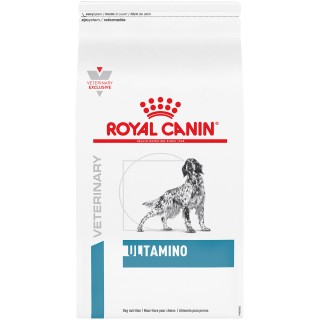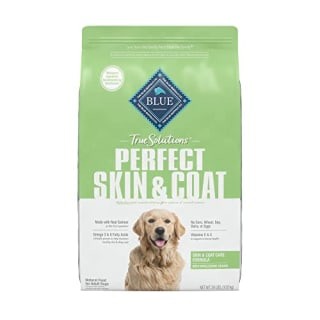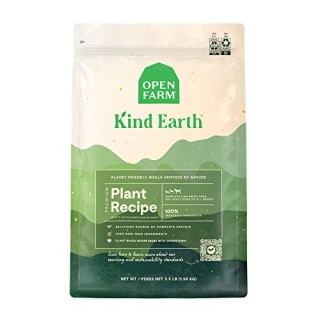What Food Is Best For Dogs With Itchy Skin? Finding the right diet is essential for relieving your dog’s itchy skin and discomfort, and FOODS.EDU.VN is here to guide you. Discover how specialized dog foods can minimize inflammation, reinforce the skin barrier, and promote a healthy coat. Explore options like hypoallergenic diets, novel proteins, and omega-3 fatty acids to find the perfect solution for your furry friend’s skin sensitivities.
1. Understanding Dog Food Allergies and Itchy Skin
Dog food allergies can manifest in various ways, with itchy skin being one of the most common and distressing symptoms. According to Dr. Cherie Pucheu-Haston, a veterinary dermatologist and professor at Louisiana State University School of Veterinary Medicine, these allergies often stem from the immune system’s reaction to specific proteins in food. When a dog’s body mistakenly identifies a protein as a threat, it triggers an immune response that leads to inflammation and skin irritation.
1.1. Common Allergens in Dog Food
Identifying the specific allergens causing your dog’s itchy skin is crucial for managing their condition. Some of the most frequent culprits include:
- Chicken
- Beef
- Dairy
- Wheat
- Soy
- Eggs
However, it’s important to note that dogs can develop allergies to virtually any ingredient in their food. According to Susan Paterson, a veterinary dermatologist and telemedicine veterinary director at Veterinary Dermatological Ltd and Virtual Vet Derms, even additives like artificial flavorings, colorants, and preservatives can trigger allergic reactions in sensitive dogs.
1.2. Symptoms of Dog Food Allergies
Besides itchy skin, dog food allergies can cause a range of other symptoms, including:
- Excessive scratching, licking, or biting
- Skin rashes, hives, or inflammation
- Hair loss
- Ear infections
- Gastrointestinal issues like vomiting or diarrhea
If your dog exhibits any of these signs, it’s essential to consult with a veterinarian to determine the underlying cause and develop an appropriate treatment plan.
1.3. How Food Allergies Develop
Dog food allergies typically develop over time as a dog is repeatedly exposed to the same ingredients. According to the American Kennel Club (AKC), the immune system may initially tolerate a particular protein, but with repeated exposure, it can become sensitized and start to react. This process is known as sensitization.
Genetics also play a role in predisposing dogs to food allergies. Some breeds, such as Labrador Retrievers, German Shepherds, and West Highland White Terriers, are more prone to developing allergies than others.
2. The Role of Diet in Managing Itchy Skin
Diet plays a pivotal role in managing itchy skin in dogs with food allergies. By carefully selecting the right food, you can minimize exposure to allergens and provide essential nutrients that support skin health.
2.1. Key Dietary Considerations
When choosing a diet for a dog with itchy skin, consider the following factors:
- Limited Ingredients: Opt for foods with a limited number of ingredients to reduce the risk of exposure to potential allergens.
- Novel Proteins: Novel proteins are ingredients that your dog hasn’t been previously exposed to.
- Hydrolyzed Proteins: Hydrolyzed proteins are broken down into smaller pieces, making them less likely to trigger an immune response.
- Omega-3 Fatty Acids: Omega-3 fatty acids have anti-inflammatory properties and can help soothe irritated skin.
- Probiotics: Probiotics promote a healthy gut microbiome, which is essential for immune function and overall health.
- Vitamins and Minerals: Ensure that the food is fortified with essential vitamins and minerals that support skin health, such as vitamin E, zinc, and biotin.
2.2. Types of Diets for Dogs with Itchy Skin
Several types of diets can be beneficial for dogs with itchy skin caused by food allergies:
- Hydrolyzed Protein Diets: These diets contain proteins that have been broken down into smaller pieces, making them less likely to trigger an allergic reaction.
- Novel Protein Diets: These diets feature protein sources that your dog hasn’t been previously exposed to, such as venison, duck, or rabbit.
- Limited Ingredient Diets: These diets contain a limited number of ingredients, reducing the risk of exposure to potential allergens.
- Elimination Diets: Elimination diets involve feeding your dog a novel protein source for a period of time to see if their symptoms improve.
- Prescription Diets: These diets are formulated by veterinarians and are specifically designed for dogs with food allergies.
2.3. The Importance of Reading Labels
Carefully reading pet food labels is essential for identifying potential allergens and ensuring that the food meets your dog’s nutritional needs. Look for an Association of Animal Feed Control Officials (AAFCO) statement, which indicates that the food provides complete and balanced nutrition for your dog’s life stage.
According to AAFCO, if a food is marked “complete” it contains all the nutrients required for a dog’s life stage and; if it is marked “balanced” it means the nutrients are present in the correct ratios for their life stage.
Pay close attention to the ingredient list, noting any ingredients that your dog is known to be allergic to or sensitive to. Be aware that some ingredients may be listed under different names, so it’s essential to research any unfamiliar terms.
3. Top Food Recommendations for Dogs with Itchy Skin
Choosing the right food for your dog with itchy skin can be overwhelming, but with the right information, you can make an informed decision. Here are some top food recommendations based on expert advice and customer reviews:
| Food | Type | Key Ingredients | Benefits |
|---|---|---|---|
| Royal Canin Adult Ultamino Dry Dog Food | Hydrolyzed Protein | Hydrolyzed poultry protein, omega-3 fatty acids, blend of fibers | Minimizes immune response, promotes healthy coat and skin, supports healthy digestion |
| Hill’s Prescription Diet z/d Skin/Food Sensitivities | Hydrolyzed Protein | Hydrolyzed chicken liver | Reduces immune reactions, improves skin irritation, supports digestion and stool quality |
| Blue Buffalo True Solutions Perfect Skin & Coat | Limited Ingredient | Deboned salmon, salmon meal, fish oil, omega-3 and -6 fatty acids | Reduces inflammation, improves skin health, strengthens skin barrier, free of wheat and soy |
| Blue Buffalo Natural Veterinary Diet NP Novel Protein Alligator | Novel Protein | Alligator, fish oil, flaxseed, omega-3 fatty acids | Manages food allergies, promotes skin and coat health |
| Open Farm Kind Earth Premium Plant Kibble | Plant-Based | Sweet potato, fava beans, whole grain barley, flaxseed, sunflower and coconut oil | Suitable for dogs with common meat protein allergies, provides omega fatty acids from plant-based sources |
| JustFoodForDogs Venison & Squash | Fresh Food | Venison, squash, Icelandic fish oil, safflower oil | Gluten-free, grain-free, preservative-free, promotes healthy skin |
| Wellness Simple Limited Ingredient Diet Lamb & Oatmeal | Limited Ingredient | Lamb, oatmeal, omega fatty acids, glucosamine | Single meat-protein source, gentle on the stomach, promotes easy digestion, soothes skin allergy symptoms, supports joint health |
3.1. Hypoallergenic Options
Hypoallergenic dog foods are specifically formulated to minimize the risk of allergic reactions. These foods often contain hydrolyzed proteins, which are broken down into smaller pieces that are less likely to trigger an immune response.
3.1.1. Royal Canin Adult Ultamino Dry Dog Food
Royal Canin Adult Ultamino Dry Dog Food is a popular hypoallergenic option that features hydrolyzed poultry proteins, omega-3 fatty acids, and a blend of fibers. This recipe is designed to minimize the chances of an immune response, promote a healthy coat and skin, and support healthy digestion.
3.1.2. Hill’s Prescription Diet z/d Skin/Food Sensitivities
Hill’s Prescription Diet z/d Skin/Food Sensitivities is another excellent hypoallergenic choice that utilizes hydrolyzed chicken liver to reduce immune reactions. This wet food option also helps improve skin irritation as well as digestion and stool quality.
3.2. Novel Protein Choices
Novel protein diets are effective in managing food allergies by introducing protein sources that your dog hasn’t been previously exposed to. This reduces the likelihood of an allergic reaction.
3.2.1. Blue Buffalo Natural Veterinary Diet NP Novel Protein Alligator
Blue Buffalo Natural Veterinary Diet NP Novel Protein Alligator is a unique option that features alligator as a novel protein source. The formula is enriched with fish oil and flaxseed to provide essential omega-3 fatty acids, which promote skin and coat health.
3.2.2. JustFoodForDogs Venison & Squash
JustFoodForDogs Venison & Squash is a fresh-food option that is cooked in a kitchen and free of gluten, grains, preservatives, and growth hormones. While lamb is its only animal protein source (which may be a novel protein for some dogs), it has the potential to cross-react in dogs with beef allergies, according to Pucheu-Haston. The recipe also includes Icelandic fish oil for omega-3 fatty acids and safflower oil for omega-6 fatty acids, promoting healthy skin, as detailed on the brand’s website.
3.3. Plant-Based Alternatives
Plant-based dog foods are becoming increasingly popular as a way to manage allergies and sensitivities. These diets rely on plant-based proteins and other ingredients to provide complete and balanced nutrition.
3.3.1. Open Farm Kind Earth Premium Plant Kibble
Open Farm Kind Earth Premium Plant Kibble is a plant-based recipe that uses sweet potato, fava beans, and whole grain barley as primary ingredients. According to Open Farm, this recipe also derives omega fatty acids from flaxseed, sunflower, and coconut oil rather than fish – so even pups with fish allergies can eat this food.
4. How to Introduce a New Food
When switching your dog to a new food, it’s essential to do so gradually to avoid digestive upset. According to the American Veterinary Medical Association (AVMA), a gradual transition allows your dog’s digestive system to adjust to the new food and reduces the risk of diarrhea or vomiting.
4.1. Gradual Transition
Start by mixing a small amount of the new food with your dog’s current food, gradually increasing the proportion of the new food over a period of 7-10 days.
Here’s a sample transition schedule:
- Days 1-2: 25% new food, 75% old food
- Days 3-4: 50% new food, 50% old food
- Days 5-6: 75% new food, 25% old food
- Days 7-10: 100% new food
4.2. Monitoring Your Dog
During the transition period, closely monitor your dog for any signs of digestive upset, such as diarrhea, vomiting, or loss of appetite. If you notice any of these symptoms, slow down the transition or consult with your veterinarian.
4.3. Consulting Your Veterinarian
Before making any significant changes to your dog’s diet, it’s always best to consult with your veterinarian. They can help you choose the right food for your dog’s individual needs and provide guidance on how to transition safely.
5. Additional Tips for Managing Itchy Skin
In addition to diet, several other strategies can help manage itchy skin in dogs:
5.1. Regular Bathing
Regular bathing with a hypoallergenic shampoo can help remove allergens and soothe irritated skin. According to Dr. Susan Paterson, it’s important to use a shampoo that is specifically designed for dogs with sensitive skin and to avoid over-bathing, as this can dry out the skin.
5.2. Omega-3 Fatty Acid Supplements
Supplementing your dog’s diet with omega-3 fatty acids can help reduce inflammation and improve skin health. Fish oil is a rich source of omega-3 fatty acids, but plant-based sources like flaxseed oil are also available.
5.3. Allergen Avoidance
Minimize your dog’s exposure to potential allergens in their environment. This may involve washing their bedding regularly, using a HEPA filter in your home, and avoiding walks in areas with high pollen counts.
5.4. Medications
In some cases, your veterinarian may prescribe medications to help manage your dog’s itchy skin. These may include antihistamines, corticosteroids, or immunosuppressants.
5.5. Topical Treatments
Topical treatments like creams, lotions, and sprays can help soothe irritated skin and relieve itching. Look for products that contain ingredients like aloe vera, oatmeal, or hydrocortisone.
6. The Importance of Veterinary Guidance
While this article provides general information about managing itchy skin in dogs, it’s essential to consult with your veterinarian for personalized advice and treatment. They can help you identify the underlying cause of your dog’s itchy skin and develop an appropriate treatment plan.
6.1. Diagnostic Testing
Your veterinarian may recommend diagnostic testing to determine the cause of your dog’s itchy skin. This may include allergy testing, skin scrapings, or blood tests.
6.2. Customized Treatment Plans
Based on the results of diagnostic testing and a thorough examination, your veterinarian can develop a customized treatment plan for your dog. This may include dietary changes, medications, topical treatments, and other therapies.
6.3. Ongoing Monitoring
Managing itchy skin in dogs is often an ongoing process that requires regular monitoring and adjustments to the treatment plan. Your veterinarian can help you track your dog’s progress and make any necessary changes to ensure the best possible outcome.
7. FOODS.EDU.VN: Your Partner in Pet Nutrition
At FOODS.EDU.VN, we understand the challenges of finding the right food for your furry friend. That’s why we’re committed to providing you with the latest information and resources to help you make informed decisions about your pet’s nutrition.
7.1. Expert-Reviewed Content
Our website features articles and guides written by experienced pet nutritionists and veterinarians. We carefully review all of our content to ensure that it’s accurate, up-to-date, and easy to understand.
7.2. Product Reviews and Recommendations
We provide unbiased reviews and recommendations of pet foods and supplements to help you choose the best products for your dog’s individual needs. Our reviews are based on thorough research, expert analysis, and customer feedback.
7.3. Community Forum
Connect with other pet owners in our community forum to share tips, ask questions, and get support. Our forum is a great place to learn from others and find solutions to common pet nutrition challenges.
7.4. Contact Us
Do you have questions about pet nutrition or need help choosing the right food for your dog? Contact us today, and we’ll be happy to assist you.
Address: 1946 Campus Dr, Hyde Park, NY 12538, United States
Whatsapp: +1 845-452-9600
Website: FOODS.EDU.VN
8. Conclusion
Managing itchy skin in dogs can be a complex process, but with the right diet and care, you can help your furry friend find relief. By understanding the role of food allergies, choosing the right diet, and working closely with your veterinarian, you can improve your dog’s skin health and overall quality of life.
Remember, foods.edu.vn is here to support you every step of the way. Visit our website today to learn more about pet nutrition and find the resources you need to keep your dog happy and healthy.
9. Frequently Asked Questions (FAQs)
Q1: What are the most common food allergens for dogs?
The most common food allergens for dogs include proteins like chicken, beef, dairy, wheat, and soy. However, dogs can develop allergies to virtually any ingredient in their food.
Q2: How can I tell if my dog has a food allergy?
Symptoms of dog food allergies can include itchy skin, excessive scratching, skin rashes, hair loss, ear infections, and gastrointestinal issues.
Q3: What is a novel protein diet?
A novel protein diet features protein sources that your dog hasn’t been previously exposed to, such as venison, duck, or rabbit. These diets can be effective in managing food allergies by reducing the likelihood of an allergic reaction.
Q4: Are grain-free diets better for dogs with itchy skin?
Grain-free diets may be helpful for some dogs with food allergies, but they are not necessary for all dogs. Many dogs can tolerate grains without any issues. It’s important to work with your veterinarian to determine the best diet for your dog’s individual needs.
Q5: What are hydrolyzed proteins?
Hydrolyzed proteins are proteins that have been broken down into smaller pieces, making them less likely to trigger an immune response. Hydrolyzed protein diets can be beneficial for dogs with food allergies.
Q6: How long does it take to see results when switching to a new food?
It can take several weeks or even months to see the full effects of a new food. It’s important to be patient and consistent with the new diet and to monitor your dog closely for any changes in their symptoms.
Q7: Can plant-based dog food help with allergies?
Yes, plant-based dog food can help with allergies. While dogs are classified as carnivores, they are physiologically omnivores, which means they don’t need an animal-based diet to obtain all their essential amino acids, according to Dottie Laflamme, DVM, Ph.D., DACVN, a veterinary nutritionist and independent consultant of animal nutrition.
Q8: What is AAFCO, and why is it important?
AAFCO (Association of American Feed Control Officials) is a nonprofit organization that sets nutritional standards for pet foods. Look for an AAFCO statement on pet food labels to ensure that the food provides complete and balanced nutrition for your dog’s life stage.
Q9: Is it necessary to consult with a veterinarian before changing my dog’s diet?
Yes, it’s always best to consult with your veterinarian before making any significant changes to your dog’s diet. They can help you choose the right food for your dog’s individual needs and provide guidance on how to transition safely.
Q10: What else can I do to help my dog with itchy skin?
In addition to diet, regular bathing, omega-3 fatty acid supplements, allergen avoidance, medications, and topical treatments can help manage itchy skin in dogs.


